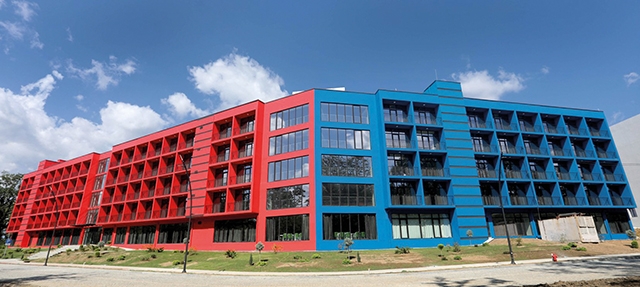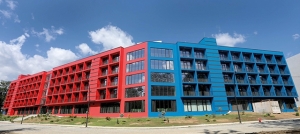Kutaisi International University Gets Set to Open its Doors
The start of this academic year in September in Georgia will be quite different from previous years. Of course, the coronavirus pandemic is affecting the educational sector greatly, and, for the first time, students will be attending their classes while wearing masks and at a distance from each other. However, that is not the only “first” that comes with this academic year here: also for the first time, Kutaisi International University, which is the largest educational institution project in Georgia in the span of several decades, will be opening its doors to students from Georgia and abroad.
Over a thousand students have registered to be the first freshmen at Kutaisi International University (KIU). While many of the university complex buildings have already been completed, extensions are ongoing, and this applies not only to the campus, but also to the programs it is offering: for the 2020-2021 academic year, KIU opens to students majoring in Mathematics, Computer Science, and Management. From 2021 onward, three disciplines are to be added: Physics, Chemistry and Biology. The following year, even more diversity will be enjoyed on the KIU campus, as students from around the world will also be able to come to KIU to major in Civil Engineering, Electrical Engineering, Energy Engineering, Education, Arts and Humanities, and Medicine.
The students and personnel of KIU will undoubtedly enjoy living and studying on the bright and freshly designed first university campus in the Caucasus region. KIU is working with various international universities and accreditation agencies to offer internationally accredited and/or world standard programs and campus living conditions, and classes will be taught in English both in classrooms and remotely.
With the quality and modernity of KIU constructions considered - a green environment that spans 153 hectares, ultra-modern academic buildings, libraries, cafeterias, well-equipped sports and road infrastructure, shared workspaces, student dormitories with studio-type rooms, furniture and modern appliances, as well as housing for academic and administrative personnel - the tuition fees and living costs seem more than reasonable, giving the impression that educating the new generation is the actual priority of the university founders. The tuition fee for the 2020-2021 Academic Year for international students in the programs of Computer Science and Management is to be 16,000 GEL ($5,500). For a Bachelors in Mathematics, international students can expect to pay a tuition fee of 9,400 GEL ($3,220), a sum which includes all teaching materials. In all three programs, the living costs for students who are not citizens of Georgia amounts to $5,000. Financial aid packages are available to cover students’ living costs, for both international and local students.
“KIU’s aim is to help reverse the brain drain by bringing prominent and successful Georgian scholars, academics, and practitioners back to Georgia by offering internationally competitive and intellectually demanding teaching and research positions at KIU,” the university website claims.
The programs in KIU have been developed, and will continue to be developed, in the college’s partnership with the Technology University of Munich. The Honorary President of Kutaisi International University is Prof. Dr. Wolfgang A. Herrmann, former President of TUM, who, in his welcoming note, referred to KIU as the “avantgardistic university,” and said that as KIU unites the international and local minds of the new generations, the college will “make Kutaisi a stronghold of Georgian science and entrepreneurship to the benefit of the country and its prosperous economic future. The alliance with TUM should open new horizons, particularly in engineering, and create new industries in the Caucasian area.”
Georgian Prime Minister Giorgi Gakharia, on a visit to the KIU campus this month, also made remarks about the importance of the college for the city of Kutaisi, the country, and the region as a whole, noting that “this is an extremely important project for Kutaisi. Kutaisi is becoming a university city. I am certain that this will render Kutaisi even more attractive.”
The PM also noted that education is the priority of the government, and KIU “is an extremely large project that was implemented, from start to finish, as a result of a private initiative, with Bidzina Ivanishvili's investment- an investment of about one billion Euros.”
There is even more to KIU: at the next stage of the university construction, a Hadron Therapy Center will be founded within the university in cooperation with IBA, one of the world's leading providers in the fight against cancer. Modern research in the fields of medical and nuclear physics will be carried out there, in addition to the treatment of oncological diseases. Two cyclotrons will be housed in the Hadron Therapy Center, funded by Cartu Fund with 40 million Euros. One of them will be used for the treatment of tumors, while the other will be used for the purpose of conducting scientific research in the field of oncology.
The goal of the contract signed between Kutaisi International University and Cartu Fund is to establish the Hadron Therapy Center on the campus of Kutaisi International University. The center will receive its first patients in Georgia in 2024.
GEORGIA TODAY spoke to Nikoloz Chkhetiani, Chairman of the Board of Cartu Fund, about the university, its importance and prospects.
We asked why, as Tbilisi would seem like a better fit for an international university, instead Kutaisi was chosen as the location of this project.
“A huge problem in Georgia is that everything is located in Tbilisi,” Chkhetiani replied. “This creates negative tendencies in the process of regional development. Our choice of Kutaisi as the place for the new university aims at bringing new life to the town, and to the entire west of Georgia.”
He tells us he saw symbolism, as well as the chance of balancing the west and east of the country, in establishing KIU.
“This is the first time since the restoration of independence of the country that a new state university has been established. I find it symbolic that more than 100 years ago, in 1918, the Tbilisi State University was established, and now one century later, independent Georgia creates a new state university, but this time in Kutaisi. I think it will bring some balance and equilibrium between west and east Georgia.”
We also asked Mr Chkhetiani to tell us why students should choose KIU. The campus-based college experience, according to him “creates unprecedented comfort and education capabilities for our future students and academic staff.” However, that is not the only advantage to the university: “We are working with many international institutions. Our partner is TUM - the Technical University of Munich. This is one of the strongest universities in the world. On site, we will have a Hadron Therapy and Research Center. For this purpose, we are cooperating with the IBA corporation, a Belgium based international consortium which is a world leader in Hadron technologies. All these facts give me the right to have hope and confidence that our project will be successful,” he says.
By Nini Dakhundaridze












